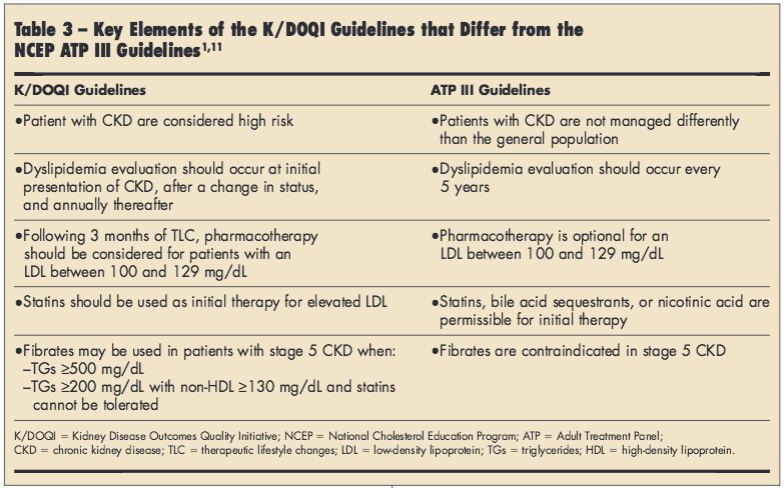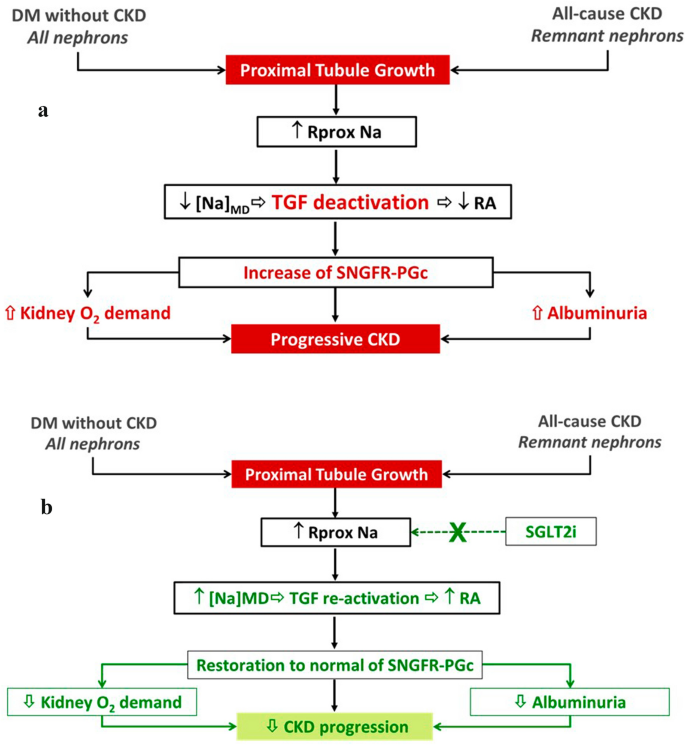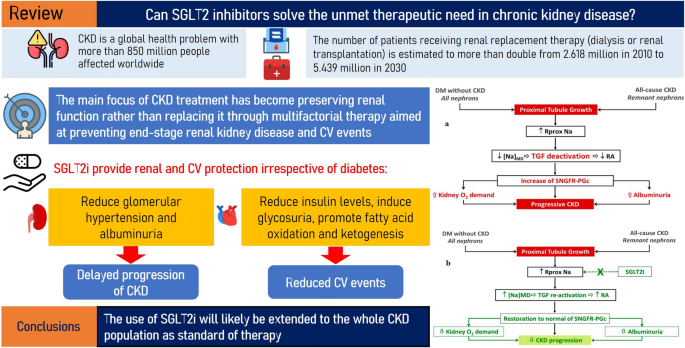ckd referral guidelines
Refer adults with CKD for specialist assessment taking into account their wishes and comorbidities if they have any of the following. Does the patient have CKD.
Assess for evidence of progression 5.
. Referral Pathway Guidance Genital cosmetic surgery. Assess for associated complications 6. It also covers managing anaemia and hyperphosphataemia associated with CKD.
Creatinine umolL or eGFR mLmin173m2 by CKD-EPI equation If patient of African descent multiply eGFR results by 1159 In patient with a new finding of reduced eGFR or a rapid rise in serum creatinine exclude causes of acute kidney injury eg. Last formal revision - August 2017. This handbook is a highly regarded evidence-based source of information providing guidance and clinical tips to help you detect manage and refer patients in your practice with CKD.
A total of 486 new GP referrals were received in 2012 and 574 in 2016 18 increase post NICE CKD guideline. More specifically the guidelines recommended the inclusion of estimated GFR and albuminuria levels when evaluating risks for overall. For more detailed information please see our referral guidance document below.
Referral Pathway Guid ance Chronic Pelvic Pain. The guidelines provide advice for management of patients in primary care. Complications CVD CKD progression other complications.
Assess GFR albuminuria 3. Persistent albuminuria ACR 60 mgmmol irrespective of hematuria 2-3 samples over 2-4 weeks. A urinary ACR of 70 mgmmol or more unless known to be associated with diabetes mellitus.
Volume depletion intercurrent illness nephrotoxins obstruction then repeat creatinineeGFR after correcting potential causes of. A quick reference guide treatment algorithms colour-coded staging tables colour-coded clinical action plans. EGFR 30 mLmin173m2 irrespective of albuminuria or hematuria.
This guideline covers care and treatment for people with or at risk of chronic kidney disease CKD. Colour coded clinical action plans outlining goals of management key management tasks and frequency of assessment by CKD stage. But late referrals eGFR.
Post NICE fewer stage 4 and 5 CKD patients were being referred. The UK eCKD Guide Referral Referral There will be differing local pathways and processes for accessing renal services. 1-4 patients with ckd who have an egfr at or below this threshold are likely at an advanced stage of.
CKD Pathway - Referral Referral Routine referral Recommended for any one of the following. Glasgow City Youth Health Service Referral Guidance. Steps to CKD Patient Care 1.
The guidance covers investigations to consider for specific symptoms and conditions as well as referral thresholds for specialist care. Overview Background History classification and controversies. This Guidelines summary covers key recommendations for primary care on the assessment of chronic kidney disease CKD.
Easy to use and interactive the handbook features. CKD Management Management of CKD. People with CKD and renal outflow obstruction should normally be referred to urological services unless urgent medical intervention is required - for example for the treatment of hyperkalaemia severe uraemia acidosis or fluid overload More detailed guidance regarding nephrology referrals was previously stated as 2.
Links to fact sheets websites and other useful resources. These thresholds have been agreed for adoption by NW London GP and consultant leads across all NW London CCGs and hospital trusts. Role of primary and secondary care.
It aims to prevent or delay progression and reduce the risks of cardiovascular disease. Seek specialist advice where patients fall outside protocols. Patients with a severely decreased estimated glomerular filtration rate egfr of 30 mlmin per 173 m 2 require prompt referral to a nephrologist for comanaged care.
It aims to provide quick online support for the diagnosis and management of CKD. Diffuse cutaneous systemic scleroderma. Consider investigating and managing anaemia in adults children and young people with CKD if.
NICE defines CKD as abnormalities of kidney function or structure present for more than 3 months with implications for health. Identify any underlying causes and risk factors for disease progression which will influence the frequency of monitoring. In patients with CKD if iron deficiency and other nutritional deficiencies are rectified and anemia persists consider erythropoiesis stimulating agents which would require specialist referral.
Referral Pathway Guidance Ovarian. This guide is currently under revision. Accelerated progression of CKD.
More patients had cholesterol-levels checked. An eGFR of less than 30 mLmin173 m2. BP control had improved.
Medication advice and treatment targets. A 5-year risk of needing renal replacement therapy of 5 measured using the Kidney Failure Risk Equation which has the four variables age sex eGFR and urine ACR 3. Chronic kidney disease CKD is a major public health concern that affects approximately 47 million persons in the United States or 148 of the US.
Managem ent of Polycystic Ovary Syndrome. Assess life expectancy and patient wishes for dialysistransplantation Criteria for. Through the use of guidelines timely referral and a multidisciplinary approach to care the ability to provide effective and efficient care for CKD patients can be improved.
This includes all people with markers of kidney damage and those with a glomerular filtration rate GFR of less than 60 mlmin173 m2 on at least 2 occasions separated by a period of at least 90 days. The primarysecondary care interface Daniel Ford Consultant Renal Physician UHCW. 131 If an adult child or young person has CKD or is at risk of it agree the frequency of monitoring eGFRcreatinine and ACR with them and their family members or carers as appropriate bearing in mind that CKD is not progressive in many people.
Referral guidelines Who to screen and when to refer. Management framework for common CKD complications. Indications for referral vary across guidelines but there is one commonality.
Referral to a nephrology specialist should be arranged if there is. Their haemoglobin Hb level falls to 110 glitre or less or 105 glitre or less if younger than 2 years or they develop symptoms attributable to anaemia such as tiredness shortness of breath lethargy and palpitations. 2021 132 When agreeing the frequency of monitoring follow.
It aims to prevent or delay the progression and reduce the risk of complications and cardiovascular disease. Follow local protocols when and where available. Frequently advice by email or telephone may help in reaching a decision.
Referral Pathway Guidance HMBCT. This guideline is endorsed by the. Evidence-based guidelines from groups including Renal Physicians Association and NKF provide tools for management of CKD patients by both generalists and nephrologists.
The UK eCKD Guide is derived from the NICE SIGN and UK Kidney Association guidelines. If a person has a confirmed diagnosis of chronic kidney disease CKD arrange monitoring for disease progression and associated complications and arrange specialist referral if appropriate.

Diabetes Primary Care Issue 23 08 2020 Vol 22 No 5 Article Testing For Kidney Disease In Type 2 Diabetes Consensus Statement And Recommendations Wounds Uk

Managing Dyslipidemia In Patients With Chronic Kidney Disease Evidence Based Guidance For Primary Care Consultant360

Managing Dyslipidemia In Patients With Chronic Kidney Disease Evidence Based Guidance For Primary Care Consultant360

Pdf Chronic Kidney Disease Screening Follow Up And Referral Semantic Scholar

Scielo Brasil Early Detection Of Chronic Renal Disease Coordinated Work Between Primary And Specialized Care In An Ambulatory Renal Network Of Peru Early Detection Of Chronic Renal Disease Coordinated Work

Optimizing The Care Of Patients With Advanced Chronic Kidney Disease Ppt Download

Can Sglt2 Inhibitors Answer Unmet Therapeutic Needs In Chronic Kidney Disease Springerlink

Can Sglt2 Inhibitors Answer Unmet Therapeutic Needs In Chronic Kidney Disease Springerlink

The Kidney Failure Risk Equation Score And Ckd Care Delivery Measures A Cross Sectional Study Kidney Medicine

Pdf A New Nursing Model For The Care Of Patients With Chronic Kidney Disease The Unc Kidney Center Nephrology Nursing Initiative

Impact Of Early Versus Late Referral To Nephrologists On Outcomes Of Chronic Kidney Disease Patients In Northern India

Can Solve Ckd Research Themes Priorities And Projects Download Table

Diabetes Primary Care Issue 23 08 2020 Vol 22 No 5 Article Testing For Kidney Disease In Type 2 Diabetes Consensus Statement And Recommendations Wounds Uk






0 Response to "ckd referral guidelines"
Post a Comment